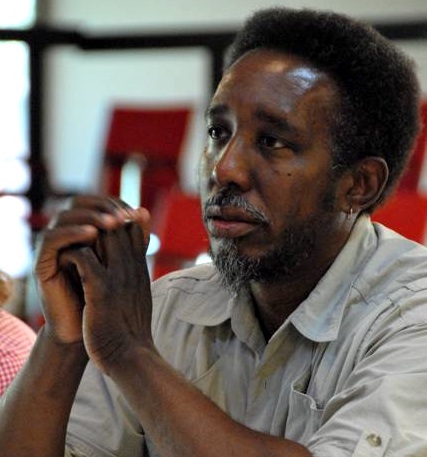After Alice and I had been together for a while, I convinced myself that the looks we got from people in Santa Cruz when we went out were starting to change. Perhaps I'd just been paranoid. Perhaps she was right, I told myself, when she insists that the looks meant no more than, Aren't those two so in love. Or: Isn't that cute, a forty-something man and a sixty-something woman. Or: He's no ageist. Or: She's really lucky, a second chance at love (not to mention the sex!), when all is said and done, and love conquers all. Maybe they didn't see me as King Kong screeching from atop the dome when they saw us together. In fact, it seemed as though they liked me. But more importantly, they seemed to trust me. I was soon called upon to counsel. I was called upon to heal. As at an End the War march, when you hear your name being called. Huffing and puffing, she pushes through the crowd and catches up to you. Can I march with you for a little while? she says. Sure, Dorothy, it's good to see you. Another hour and your lungs are tired from chanting, Hell no we won't go, we won't fight for Texaco! Look, she says, pointing to a park bench across the street. She takes you by the hand and together you minnow through the flow of demonstrators to the other side of the street.
On this march the two of you renew your pledge to keep fighting that Son of a Bush! Arm in arm, hand in hand, Black and White and all the Rainbow colors in between are marching with you down the street. You and Dorothy catch your breath on a park bench. You let the sea of signs, towering puppets, and noisemakers flow past. Mind if I ask you something, Frank? I'm troubled. Deeply troubled. Ask me anything, Dorothy. She tells you: I couldn't even dream of saying this to you if I didn't know how you and Alice are. You're the perfect couple. Well, you say (your signature well), we work at it: that's the key, Dorothy, hard work and commitment. Then you take her hand and you ask her what's troubling her. It's really embarrassing, but I've got to get it off my chest, she says. You place your other hand over hers. It's Erica, she says, my daughter, you remember Erica. Frank, I don't want you to take this the wrong way, but I feel so empty. Dorothy, you say, just breathe deeply, let it all out. Erica's pregnant, she exclaims, and...and the father is Black. She won't have an abortion. What is this fixation of hers, Frank? It's not that she's with a Black guy, we all dated Black guys in the sixties, it's not a racist thing with me. But Erica only dates Black guys. It's unhealthy. A fetish. And now this. I had to talk with you, Frank–anyone else would've called me a racist. I'm not racist. I'm a mother. It's a mother's pain, Frank: that's not Black, or White, or Red or Yellow. That's human nature. No mother wants to think of her daughter falling in and out of bed with a fetish. Tell me, Frank, lay it on me like folks laid it on each other back in the day: Does Erica need therapy? Is she psychotic? She must be psychotic. Frank? Frank, your palms are sweating.
From Frank B. Wilderson, III's Incognegro
